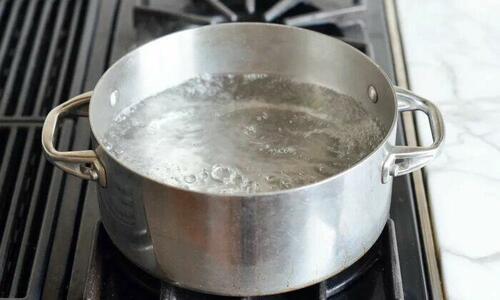Authored by Amie Dahnke via The Epoch Times (emphasis ours),
Boiling tap water is good for more than just killing certain harmful pathogens. It can also destroy contaminants such as microplastics and chemicals, making drinking water safer to drink.

A new research letter published in Environmental Science & Technology Letters indicates that boiling tap water for just five minutes could reduce the amount of microplastics by up to 90 percent. Researchers from Guangzhou Medical University and the Center for Environmental Microplastics Studies in China recommend boiling water in nonplastic electric kettles on gas stoves to remove impurities such as polystyrene, polyethylene, and polypropylene.
According to the researchers, boiling water has been used since ancient times as a purification method in some Asian countries. “This simple boiling-water strategy can ‘decontaminate’ [nano- and microplastics] from household tap water and has the potential for harmlessly alleviating human intake of [nano- and microplastics] through water consumption,” they wrote.
Harder Water Captures More Microplastics
Water of a certain alkalinity and hardness typically produces incrustants—insoluble mineral remnants like calcium carbonate—upon boiling. For the study, the researchers hypothesized that calcium carbonate encounters nanoplastics as it crystallizes in hot water. The calcium carbonate then encapsulates the nanoplastics as it becomes the flaky crust you sometimes see at the bottom of your tea kettle.
The study showed that boiling hard tap water containing 300 milligrams per liter (mg/L-1) of calcium carbonate reduced nano- and microplastics by nearly 90 percent, while water containing 80 mg/L-1 reduced particles by 84 percent. In soft water samples containing less than 60 mg/L-1 of calcium carbonate, boiling still reduced plastics by over 25 percent.
The Problem With Millions of Tons of Plastic
Because of our heavy reliance on plastic, nanoplastics and microplastics are common in groundwater and surface water around the globe. Microplastics are truly everywhere, having been detected as far south as Antarctica and north as the Arctic. These insidious particles have even been detected at the peak of Mt. Everest and down in the Mariana Trench. In fact, plastic comprises the largest portion of marine garbage; according to a 2020 study published in Science of the Total Environment, more than 8 million tons of plastic entered the ocean in 2017. That number represented over 33 times more plastic than the amount that had entered the ocean in 2015, indicating a disturbingly worsening problem.
As plastic disintegrates, microscopic pieces are released into the environment. Microplastics are typically less than 5 millimeters in size but can break down into even smaller pieces called nanoplastics. Nanoplastics are nearly impossible to see at 1 micrometer in size. The micro and nano pieces have been found in water, air, soil, food, and table salt, according to some studies.
The health effects of nano- and microplastics haven’t been fully realized. Still, research has suggested that their accumulation in the human body can cause insulin resistance, liver metabolic disorder, DNA damage, organ dysfunction, immune response issues, neurotoxicity, and reproductive harm.
While the research team only focused on three types of nanoparticles, the discovery is a boon for public health. The team estimated that people who boil their water take in two to five times less nanoplastics than those who do not.
“Drinking boiled water apparently is a viable long-term strategy for reducing global exposure to [nano- and microplastics],” the research team wrote, adding that it is likely more effective than drinking bottled water, especially bottled in plastic. The average liter-sized bottle of water contains 240,000 pieces of nanoplastic, which is 10 to 100 times more particles than previously thought.